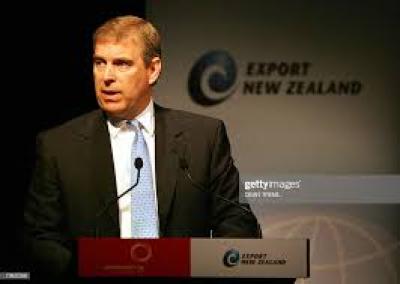HRH’s deft handling of awkward trade meeting revealed depth of character, patience, remembers National Press Club president
Prince Andrew lamented the transition of the televised weather broadcast into entertainment. “I miss the isobars,” he confessed referring to the whorls and lines on the now disappeared diagrams that represented the connecting points having the same atmospheric pressure at a given time or on average over a given period.
HRH was dismayed that so much applied science in the media was taking a back seat to the imperative to entertain.
We met at government house in Wellington, New Zealand, and Prince Andrew was on tour as Britain’s trade “ambassador” working for United Kingdom Trade and Industry, the nation’s central promotion and development agency.
The prince sat at the head of a horse shoe shaped gathering of which I was a component through having at the time a role with what was then known as the British New Zealand Trade Council, which dates back to 1917, recalls now National Press Club president Peter Isaac
Andrew had a crisp, incisive manner. Nothing other-worldly about him. He fixed the group, looking at us directly, friendlily.
The British High Commissioner at the time George Fergusson, who had once himself held down a governmental trade promotion assignment, piped up about the international prospects for New Zealand honey.
Fergusson went into detail about the medicinal properties of honey, and did so at some length.
He then segued into a random history of the electronic microprocessor.
It occurred to me that the point of the story might have been to remind the prince of how the microprocessor patents had been allowed to slip way to Asia before being at the very last moment repatriated to the English speaking realm, the United States.
Geordie Fergusson, the last in a dynastic succession of British proconsuls to New Zealand, finally allowed his electronics contribution to taper off without it defining any special lesson, or indeed, point.
Andrew had a reputation for petulance, for being easily irritated, and it occurred to me that HRH might be becoming somewhat peeved about Fergusson taking over what was designated as his, HRH’s, show.
Andrew (pictured above at the time) listened attentively and with apparent interest to this vice regal dissertation.
On the heels of this followed now a question that surprised everyone including Andrew.
A local departmental trade functionary asked HRH about his golf, and his prospects for practising it in New Zealand.
Bringing up an off-agenda topic with a member of the royal family is a not unfamiliar play, especially with Andrew’s father, Prince Philip.
It is of course risky. It either catches the mood of the moment or it does not. This one did not.
This was not immediately apparent to the public service questioner, it turned out.
Andrew’s expression grew quizzical, but only briefly, and he sought to deter the issue by focussing on another imminent question, this one on the beaten track about trade and technology.
But the questioner persisted.
“We know all about you and your golf,” was the chummy follow up from the functionary.
“Come on…..we all know it is your passion……”
The prince’s private secretary now cut in suggesting that the prince extrapolate on a more focused point about commonwealth trade.
Andrew who speaks in a middle class English accent, and not the trademark drawl so many antipodeans associate with the royal family, took up the threads without allowing, if in fact, he felt it, any trace of irritation to cross his face.
He was at ease. The private secretary brought the event to a close. There was another pressing appointment, it seemed. Andrew was ushered out, yet gave the impression that he would much prefer chewing the cud with us.
Andrew presented the picture of a technocrat and a people-person, an encompassing ability that is by no means widespread.
As royalty becomes treated as reality show stars, and as reality show stars gravitate to royal status, Prince Andrew has become one of the most caricatured individuals on the face of the earth.
The profession of royalty has much in common with Andrew’s other profession, that of arms in that they are both hurry-up-and-wait occupations.
It is in the extended waiting periods between engagements in which lurk the unforeseen and contemporary perils

